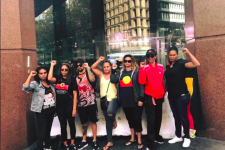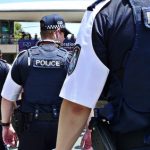Time for a Treaty: An Interview With FISTT’s Lynda-June Coe

Australia is the only settler colonial nation not to have entered into a treaty with First Nations peoples. While countries like New Zealand and Canada have treaties in place, successive federal governments here have refused to even consider such an agreement.
Although, treaty processes have commenced at the state level in some jurisdictions. South Australia began negotiations in December 2016. But, the new Marshall government brought them to a halt last April stating it has “other priorities.”
Treaty negotiations are currently underway in Victoria. Recently, Greens MP Lidia Thorpe moved a motion calling on the government to stop all sales of Crown land until a treaty is signed, as internationally treaties have involved the transfer of state-owned land to traditional owners.
However, rather than consider a treaty, the federal government has been pushing for constitutional recognition. This would involve a series of amendments to the constitution that would lead to Indigenous people being included in the document they were excluded from in the first place.
In May last year, Aboriginal and Torres Strait Islander delegates gathered at the National Constitution Convention in Uluru rejected constitutional recognition and proposed a constitutionally enshrined Indigenous representative body be established. But, former PM Malcolm Turnbull simply dismissed this proposal.
Ongoing atrocities
The United Nations has condemned Australia’s treatment of Aboriginal and Torres Strait Islander peoples on multiple occasions. Indeed, the First Peoples of this continent are the most incarcerated people in the world.
In June this year, there were 12,005 Indigenous inmates being detained in Australian prisons. This accounted for 28 percent of the adult prisoner population, while First Nations peoples only make up 2.8 percent of the overall populace in this country.
Over the last decade, there’s been 147 Indigenous deaths in custody and 407 since the 1991 Royal Commission into deaths in custody ended. Five such deaths have occurred in NSW since December 2015, if you include Patrick Fisher who fell to his death while trying to evade police in February.
And while former prime minister Kevin Rudd apologised for the stolen generations back in 2008, Aboriginal and Torres Strait Islander children are still being forcibly removed from their homes at unprecedented rates. In June last year, there were 17,644 First Nations kids in out-of-home care.
Mobilising for change
Fighting In Solidarity Towards Treaties (FISTT) is a social and political initiative that represents and aims to liberate First Nations peoples. The grassroots group has had a strong presence at actions and rallies since it was first established back in 2016.
Lynda-June Coe is a long-time Indigenous rights activist and a representative of FISTT. The Wiradjuri and Torres Strait Islander woman is also the niece of Paul Coe, who was a prominent member of the Black Power movement in Redfern.
Sydney Criminal Lawyers® spoke with Ms Coe about why this country hasn’t established a treaty as yet, the need for an independent deaths in custody oversight body and the ongoing policy of genocide.
Firstly, your organisation has been campaigning for a treaty or a series of treaties to be established between Australian governments and the various Indigenous nations. Ms Coe, what would a treaty process entail?
In the first instance, a treaty has to go back to 1770. It has to look at the history around the doctrine of the country, the settlement of the country, and the myth that the landscape was terra nullius.
Our position on a treaty is that Aboriginal lore has been practiced in this country since time immemorial. Aboriginal lore still exists in Australia. It exists in the land. And it exists with our people.
That recognition has to come about for a treaty: through an equal platform to negotiate and redress this historical inaccuracy around terra nullius.
So, it’s that truth telling component that we keep hearing about in the media. And the basis of that goes right back to the doctrine of the country: the doctrine of terra nullius and settlement.
Of course, since British occupation, we’ve had experience of erasure of Indigenous peoples and erasure of Indigenous consent. There’s the issues around consent.
Sovereignty is the basis of any treaty-making agreement. And hopefully what that will entail looking at our country through the eyes of Aboriginal people – not just as a commodity or a property right.
Other nations, such as Canada and New Zealand, have entered into treaties with First Nations peoples. Is it your understanding that a treaty wasn’t established in this country because of the doctrine of terra nullius?
Absolutely. We believe that it was in the best interest of the colony to deny any rights of Indigenous people purely to maintain it as a white only space So, essentially it was to create a new Britain for whites only. And as I said before, to erase Indigenous consent.
With the Canadian and New Zealand experiences both Indigenous groups resisted heavily against colonial occupation, therefore they had to enter into some kind of agreement.
We’ve always resisted here in this country. FISTT itself is a representation of the ongoing defence to country.
We still maintain the position that we are currently political prisoners in our own country. The colonial regime is still insistent upon our extermination and the annihilation of our society.
Deaths in custody is a clear example of that. The 1991 Royal Commission and its recommendations have been found to be a failure.
In response to recent revelations regarding Aboriginal deaths in custody, Indigenous affairs minister Nigel Scullion said the government is reviewing the Royal Commission’s recommendations.
Ms Coe, in your opinion, what has to happen in regard to deaths in custody to bring about meaningful change?
There definitely needs to be an independent body that investigates any deaths in custody. Police investigating its own system is corrupt. And what we need is external oversight of these deaths that have been allowed to continue since 91.
As Indigenous people, our experiences are essentially that we are still going through a system of genocide. It’s a policy of genocide, however, they try and hide it amongst their framework.
You’ve mentioned a policy of genocide. So, would that incorporate the high Indigenous incarceration rates in this country?
Absolutely. We have the highest incarceration rate in the world. And we know that Aboriginal women have the highest growing population in prison as well.
The forced removal of children is now 400 times greater than that of the stolen generation. These regressive governments are continuously attacking Aboriginal peoples and our livelihood.
The apology to the stolen generation was a symbolic gesture, but we haven’t seen any improvements in terms of closing the gap or addressing the state of affairs in our communities: the poverty, the low education rates, domestic violence, and alcohol and substance abuse.
And then there’s this new position created for Tony Abbott, who advocated loudly for the closure of 150 remote communities in Western Australia under his watch.
These are all representations of that white colonial concept of racial supremacy. And it’s not going away, it’s actually getting uglier.
As you’ve just mentioned, the Morrison government has started off by appointing Tony Abbott as special envoy on Indigenous affairs. What sort of impact will putting a person like Abbott in this position have?
I have no doubt that it will be highly damaging. He will push for further acts of assimilation and the homogenising of Aboriginal people.
I honestly don’t believe he has any interest or any empathy for Aboriginal people and communities. His interests are self-serving and maintaining neoliberal conservative views at any cost.
Linda Burney, Pat Dodson and the National Congress have all stated, “We’ve asked for a voice, and we’ve got Tony Abbott.”
It really stipulates how regressive this government is in failing to negotiate or even having a conversation with Aboriginal people in terms of resolving the issues in our communities and moving forward together. That’s not happening at all.
The National Constitution Convention rejected constitutional recognition last year. It released the Uluru Statement From the Heart, which called for a constitutionally enshrined Indigenous representative body.
What’s your opinion on the constitutional reform proposal put forth at the convention?
It’s not very clear in terms of the question around what will go into the constitution. We also have the issue that we only comprise 3 percent of the population, so regardless of our position, we’re not going to be well represented or elevated in that space.
Once again, it goes right back to the issue of treaty and consent. There needs to be a discussion around what we want as a people. Where do we want to sit? Do we want to be in the constitution? Or do we want to be left out of it?
The constitution itself was established by the British colony to exclude Aboriginal people and to erase our history and presence in the country. So, why would we then put our hands up to go into this document with no progress or improvements on the livelihood in our communities or our personal lives?
To tell you the truth, I’m very tired of it and I’m only a young woman.
The fact that we’ve had two young people chased into the Swan River this week alone is a continuation of this colonialism and the total lack of regard for Aboriginal people, let alone humanity.
Even though the National Constitution Convention rejected constitutional recognition, there are those in parliament who still believe it’s the way to proceed.
You reject constitutional recognition. What are the issues with it? And why do you think politicians have been so focused on it rather than treaty?
Once again, it’s self-serving. The interest is purely in what they can derive from that recognition.
It was heavily propagandist. We saw it everywhere within our communities: the Recognise symbol. Usually when that happens, it’s not going to be a good outcome for our mob.
There was a grassroots movement that put out the No campaign as well. So, we started educating our mob in communities around this issue of consent. And until that conversation happens, then we won’t participate in any kind of dialogue.
There’s also these agendas around maintaining the integrity of the nation. And ensuring that it benefits the white economy at all costs. The Business Council of Australia was heavily involved in endorsing Recognise.
So, a lot of money was pumped into it. But, there was not a lot of education and awareness being filtered down into the community. So, that was a warning for some of us young people.
Currently, there’s a treaty process taking place in Victoria. What do you think about the treaty process that’s underway there?
It doesn’t actually fit into a model of self-determination. It’s state determination. Lidia has been calling for clan-based treaties and decision-making. Her voice is being lost amongst that. We find that it’s not going to be worth the paper it’s written on.
The terms of reference are heavily paternalistic. Aboriginal people down there do not consent to the term Victorian Aboriginals, which is heavily represented in the terms.
Our people are hesitant to come on board with anything that doesn’t provide an equal platform to negotiate, which is what any treaty should make arrangements for.
And lastly, although discussions about treaty have been happening on the ground, multiple Australian governments have refused to consider such an agreement.
Ms Coe, what needs to occur in order to put the issue of treaty front and centre?
Once we see a generational change, and the next mob start coming through, this nation will hopefully become mature enough to have these conversations around treaty-making.
And not just a state interpretation of what a treaty or self-determination looks like, but an international model for agreement-making between both groups.
Australia is a bit behind the wagon in terms of having a healthy dialogue with Aboriginal peoples. And it’s about time we removed those colonial shackles and start maturing as a nation and looking at people, rather than just constructs of race, which doesn’t serve in the best interests of the entire nation.







